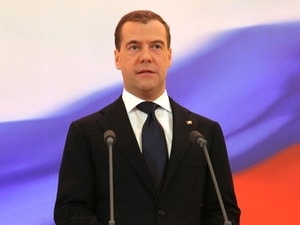Mr. Medvedev was approved as Russian Prime Minister.
In an extraordinary plenary session on the afternoon of May 8, with 299 votes in favor and 144 votes against (while the minimum number of votes required by law is 226 votes), the Russian State Duma (Lower House) with 443/450 delegates attending the meeting, approved former President Dmitry Medvedev as the new prime minister.
In an extraordinary plenary session on the afternoon of May 8, with 299 votes in favor and 144 votes against (while the minimum number of votes required by law is 226 votes), the Russian State Duma (Lower House) with 443/450 delegates attending the meeting, approved former President Dmitry Medvedev as the new prime minister.
Before the State Duma deputies voted, new President Vladimir Putin asked Russian deputies to support the approval of Mr. Medvedev as prime minister.

Mr. Dmitry Medvedev is about to become the new Prime Minister of the Russian Federation.
(Source: Getty Images)
President Putin introduced Mr. Medvedev as an experienced politician who has initiated many important reforms in Russia recently related to the political system and anti-corruption, aiming to improve the efficiency of the state apparatus, build a court system and protect the law capable of protecting truth and justice, and is a person who sincerely loves the Fatherland of the Russian Federation. According to President Putin, in his new position, Mr. Medvedev will cooperate constructively with all political parties and social organizations in Russia.
Speaking next and answering questions from the leaders of the four factions with representation in the State Duma, Mr. Medvedev declared that if appointed prime minister, he is ready to dialogue with all political forces and factions in Russia, and is ready to expand parliamentary control over federal budget expenditures.
He mentioned the main directions of the new government's activities, including continuing the strategy of modernizing all aspects of the country's life, first of all modernizing the economy, fighting corruption, poverty and unemployment. He stated that the government's policy is to perfect and standardize the labor payment system, prioritize the development of Siberia and the Far East, and at the same time raise the living standards of people in these regions to the level of Europe, only intervene in the economy when necessary or in times of crisis, but continue to support agriculture through controlling fertilizer prices and farming techniques under the conditions of Russia's accession to the World Trade Organization (WTO).
He affirmed that he would advocate for business development and competition, removing officials from the ranks of the Board of Directors of companies and corporations and replacing them with highly qualified directors. He outlined specific development targets, including reducing energy consumption to 40% by 2020, limiting the budget deficit in the coming period to 1% of Gross Domestic Product (GDP), striving to increase the average life expectancy of Russians to 75 years by 2018, spending more than 2,000 billion rubles (nearly 67 billion USD) in the next three years to develop the transport network, maintaining preferential air fares for the Siberia-Far East region and Kaliningrad province, spending 400 billion rubles to improve living conditions for 30 million Russians before 2015, spending up to 5 trillion rubles on the education sector in the next 8 years, etc.
According to the Russian Constitution, after President Putin signs the appointment decree, Mr. Medvedev will officially become the new Prime Minister of the Russian Federation./
According to (Vietnam News Agency)
